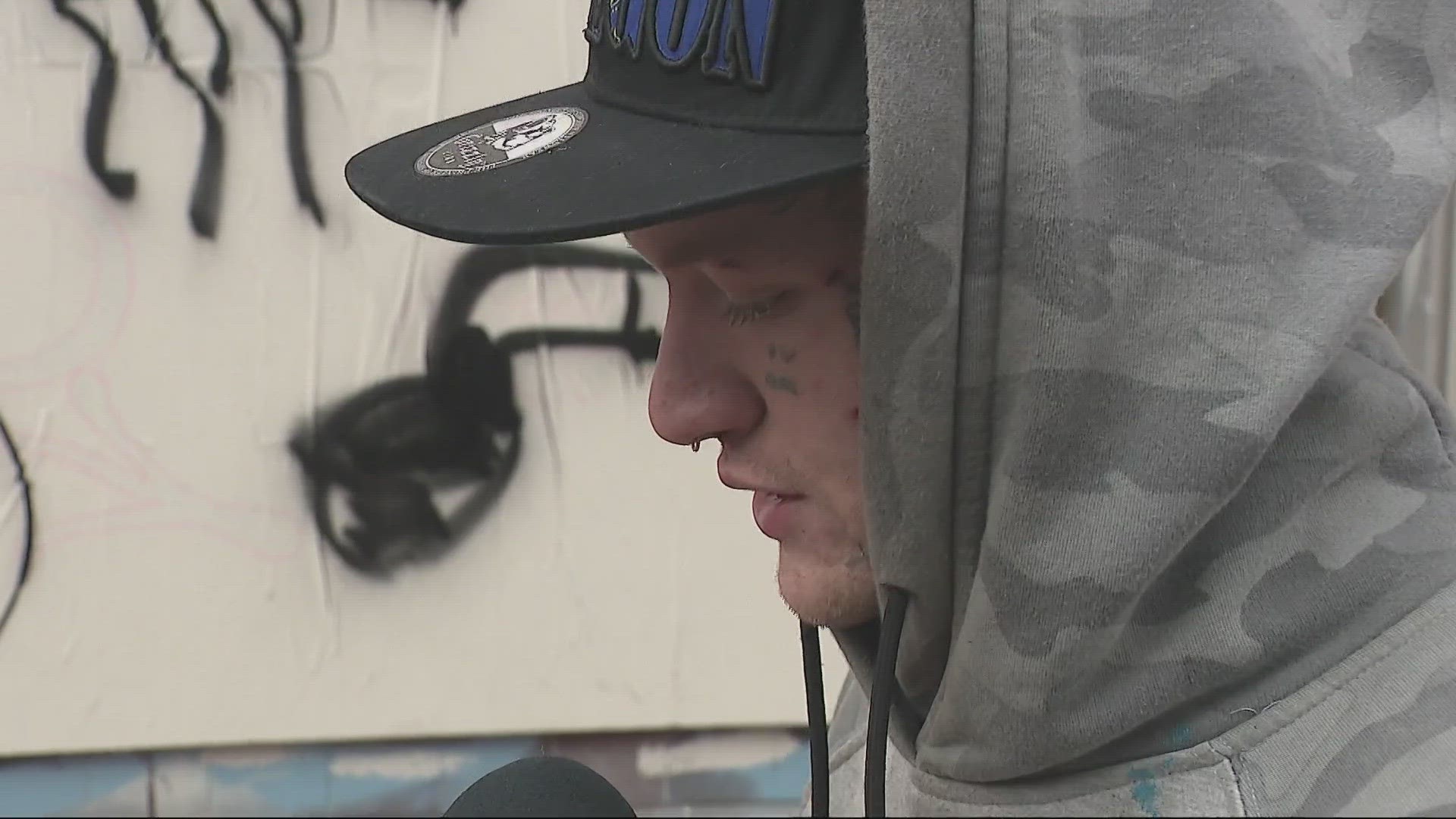PORTLAND, Ore. — Editor's note: Reporter Blair Best, who covers homelessness and housing for KGW, narrated this story from her perspective. These events occurred last Thursday morning.
The early-morning rain shines against a black SUV. That’s our ride into an area of downtown Portland where the city's addiction and homelessness crisis is on full display at seemingly all hours of the day.
It’s 6 a.m. on a Thursday. My photographer Ken McCormick and I hop into the car along with outreach worker Isaac Salazar and his friend David.
We’re about to search for a young homeless man we met two days ago who overdosed on fentanyl and was revived by police after multiple doses of Narcan. When we first met him, he asked us for help.
At the time, we called the team at Cielo Treatment Center and West Coast Sober Housing. They set up a bed for Nate at 7:30 Thursday morning at Fora Health — but they had yet to find him on the streets in order to get him there.
“Pretty much right now it’s going to be pretty difficult finding somebody this early in morning,” Salazar says as we crossed the Burnside Bridge.
The challenging timeframe is dictated by the detox centers.
“They admit everybody in the morning. It’s a process to run their insurance, UA them, search them they have to bath before going in some of them may have bed bugs or whatever from sleeping on the streets,” Salazar explains.
In the back seat, I sit next to Isaac’s friend David, who’s there to search for his son, Ryan. We met Ryan on Monday as well, but he had a wildly different outlook than Nate. He told us that he loved the homeless lifestyle and didn’t want any help.
Regardless, Ryan's father is determined to save him.
“I’m a little anxious — hopefully we see Ryan this morning,” David says. “When the payoff comes .... man, it's good you know when that person finally latches on says, 'I need help.'”
David explains how both he and Isaac are in recovery, so they know what it’s like firsthand.
“I think now working on my fifth year. I had a lot of relapses,” David says.
When we arrive downtown, the rain isn't letting up. We park along Southwest 4th Avenue and Washington Street, a corner where police have responded to an alarming number of fentanyl overdoses in recent weeks.
The outreach worker calls Nate’s family, who have already been out searching for him. They decide to split up into teams of two. It’s now 6:30 a.m. and they have exactly one hour to find him.
In the next hour, David uses pictures of the two young men he has on his phone to show nearly every homeless person he sees. We talk with a large group using drugs on the south side of the block. About a half dozen needles are tucked into one man’s black headband, almost like a crown.
We quickly learn that Nate was well known in the area. Several homeless people call him their "best friend" and say they know he was trying to get into treatment. After hectically circling the block, we run into Nate’s family. They fear that time is running out.
“It tears my heart. I feel I can’t help but not stop you know what I mean," says one of Nate's brothers. "I don’t want my brother to die, that’s where I feel exactly where it’s at — looking the other way and saying 'Oh, my brother will figure it out,' that’s giving up.”
A crew from Downtown Portland Clean and Safe also know Nate and say they will keep an eye out for him. There’s now 15 minutes left before Nate’s bed at Fora Health — one of two large-scale detox centers in the city — is given to the next person in line.
“The window’s closing,” David says while hurrying to the next group of homeless people.
After searching a nearby parking garage, time runs out.
“Yeah, we lost the window of opportunity. Right now there’s probably a group of people over there who are trying to get in where he had a referral, so he would’ve got in — he had a bed saved for him,” Salazar explains.
“We definitely tried planting seeds, planting seeds,” David adds.
They were planting seeds in a field of pain felt not only by those on the streets, but by the families trying to find them.
As it turns out, later that morning Nate texted his brother that he was several blocks away. It wasn’t until the next morning that they finally got him into detox when another bed opened at Fora Health. At last check, he’s still there.
However, for David, the search for his son lingers on.
“I think a lot has to do with the commitment. I mean if you want to get clean it’s a matter of getting up and getting in it,” David says.
The outreach worker expresses that Portland needs something like a sobering center, a place downtown where people looking to detox can check themselves into — making it easier for outreach teams and families to find them.
As for Nate, he’s been in and out of detox facilities before. His family is just praying that this time will be different.

